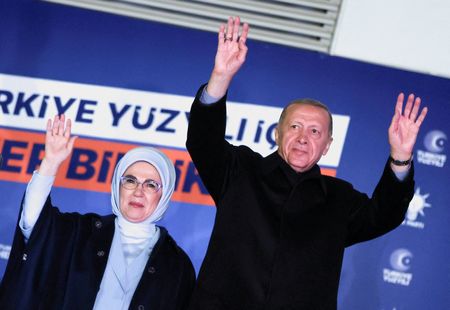 1
1 1
1
By Orhan Coskun, Ece Toksabay and Ali Kucukgocmen
ANKARA (Reuters) -Turkey headed for a runoff vote after President Tayyip Erdogan led over his opposition rival Kemal Kilicdaroglu in Sunday’s election but fell short of an outright majority to extend his 20-year rule of the NATO-member country.
Neither Erdogan nor Kilicdaroglu cleared the 50% threshold needed to avoid a second round, to be held on May 28, in an election seen as a verdict on Erdogan’s increasingly authoritarian path.
The presidential vote will decide not only who leads Turkey but also whether it reverts to a more secular, democratic path, how it will handle its severe cost of living crisis, and manage key relations with Russia, the Middle East and the West.
Kilicdaroglu, who said he would prevail in the runoff, urged his supporters to be patient and accused Erdogan’s party of interfering with the counting and reporting of results.
But Erdogan performed better than pre-election polls had predicted, and he appeared in a confident and combative mood as he addressed his supporters.
“We are already ahead of our closest rival by 2.6 million votes. We expect this figure to increase with official results,” Erdogan said.
With almost 97% of ballot boxes counted, Erdogan led with 49.39% of votes and Kilicdaroglu had 44.92%, according to state-owned news agency Anadolu. Turkey’s High Election Board gave Erdogan 49.49% with 91.93% of ballot boxes counted.
Thousands of Erdogan voters converged on the party’s headquarters in Ankara, blasting party songs from loudspeakers and waving flags. Some danced in the street.
“We know it is not exactly a celebration yet but we hope we will soon celebrate his victory. Erdogan is the best leader we had for this country and we love him,” said Yalcin Yildrim, 39, who owns a textile factory.
ERDOGAN HAS EDGE
The results reflected deep polarization in a country at a political crossroads. The vote was set to hand Erdogan’s ruling alliance a majority in parliament, giving him a potential edge heading into the runoff.
Opinion polls before the election had pointed to a very tight race but gave Kilicdaroglu, who heads a six-party alliance, a slight lead. Two polls on Friday showed him above the 50% threshold.
The country of 85 million people – already struggling with soaring inflation – now faces two weeks of uncertainty that could rattle markets, with analysts expecting gyrations in the local currency and stock market.
“The next two weeks will probably be the longest two weeks in Turkey’s history and a lot will happen. I would expect a significant crash in the Istanbul stock exchange and lots of fluctuations in the currency,” said Hakan Akbas, managing director of Strategic Advisory Services, a consultancy.
“Erdogan will have an advantage in a second vote after his alliance did far better than the opposition’s alliance,” he added.
A third nationalist presidential candidate, Sinan Ogan, stood at 5.3% of the vote. He could be a “kingmaker” in the runoff depending on which candidate he endorses, analysts said.
The opposition said Erdogan’s party was delaying full results from emerging by lodging objections, while authorities were publishing results in an order that artificially boosted Erdogan’s tally.
Kilicdaroglu, in an earlier appearance, said that Erdogan’s party was “destroying the will of Turkey” by objecting to the counts of more than 1,000 ballot boxes. “You cannot prevent what will happen with objections. We will never let this become a fait accompli,” he said.
But the mood at the opposition party’s headquarters, where Kilicdaroglu expected victory, was subdued as the votes were counted. His supporters waved flags of Turkey’s founder Mustafa Kemal Ataturk and beat drums.
KEY PUTIN ALLY
The choice of Turkey’s next president is one of the most consequential political decisions in the country’s 100-year history and will reverberate well beyond Turkey’s borders.
A victory for Erdogan, one of President Vladimir Putin’s most important allies, will likely cheer the Kremlin but unnerve the Biden administration, as well as many European and Middle Eastern leaders who had troubled relations with Erdogan.
Turkey’s longest-serving leader has turned the NATO member and Europe’s second-largest country into a global player, modernised it through megaprojects such as new bridges and airports and built an arms industry sought by foreign states.
But his volatile economic policy of low interest rates, which set off a spiralling cost of living crisis and inflation, left him prey to voters’ anger. His government’s slow response to a devastating earthquake in southeast Turkey that killed 50,000 people earlier this year added to voters’ dismay.
PARLIAMENTARY MAJORITY
Kilicdaroglu has pledged to revive democracy after years of state repression, return to orthodox economic policies, empower institutions that lost autonomy under Erdogan and rebuild frail ties with the West.
Thousands of political prisoners and activists could be released if the opposition prevails.
Critics fear Erdogan will govern ever more autocratically if he wins another term. The 69-year-old president, a veteran of a dozen election victories, says he respects democracy.
In the parliamentary vote, the People’s Alliance of Erdogan’s Islamist-rooted AKP, the nationalist MHP and others fared better than expected and were headed for a majority.
(Reporting by Mehmet Emin Caliskan, Bulent Usta, Ezgi Erkoyun, Can Sezer, Deniz Uyar and Jonathan Spicer; Writing by Tom Perry, Daren Butler and Alexandra Hudson; Editing by Jonathan Spicer, Cynthia Osterman and Stephen Coates)